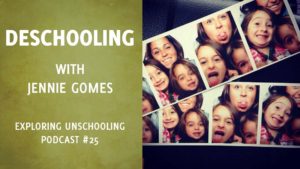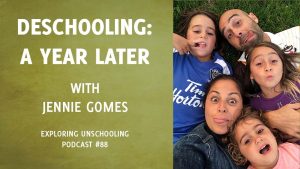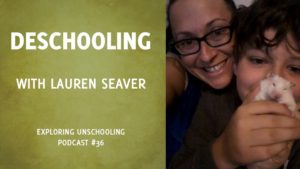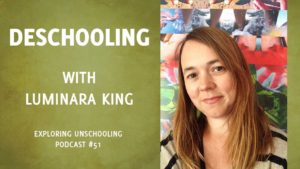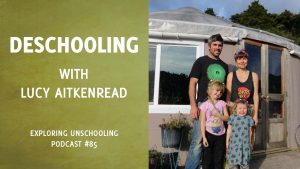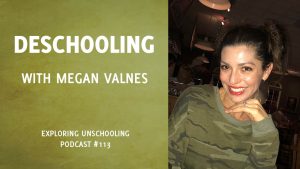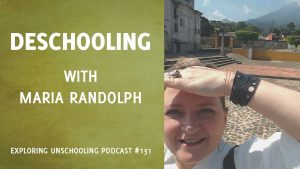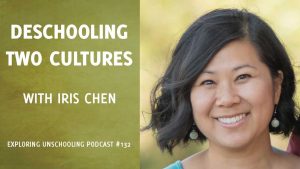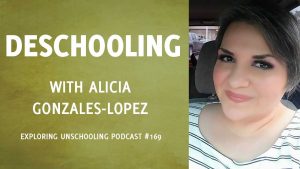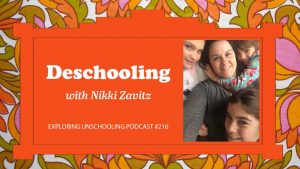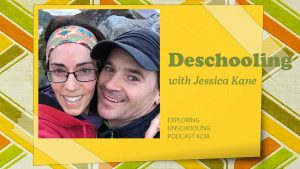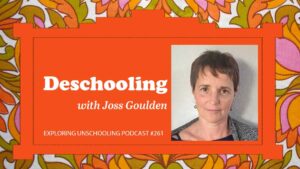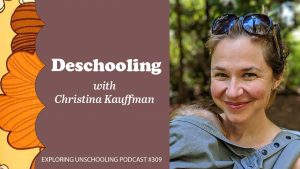This is an exciting stage! You are so full of questions, sometimes you think you’ll burst. Other times your head is swimming with all the answers you find. For me this is immersion learning at its best. While you’re going through this process, use a part of your mind to sit back and watch objectively. It will help you understand the learning process itself and be open to seeing it in your kids—whether they’re learning about reading, numbers, video games, or their favourite TV show. How are you learning about unschooling?
And take a moment to notice how it doesn’t look like “school” at all. Where’s your teacher? Are you reading this during the hours of 9am – 3pm exclusively? Can you go to the bathroom when you need to? Is anyone going to test you to make sure you understood it “properly”? And by whose definition of “properly”? Does this make your learning any less valuable? Any less “real”? Are you starting to get the picture?
Wanna delve deeper?
Here is some more info for you to ponder! (Keep scrolling or use these quick links.)
Deschooling Podcast Episodes | Defining Unschooling | Learn vs Teach | What is Deschooling? | What will they do all day? | Blog Picks
Deschooling Podcast Episodes
I have an ongoing series on the Exploring Unschooling podcast where I chat with newer unschooling parents about the joys and challenges of deschooling. Click on the episode images to have a listen!
Defining Unschooling
As you start learning about unschooling, one of the first questions that often comes to mind is “What exactly IS unschooling?” Such a seemingly innocent question, but it can be a challenge to answer, let alone to do so succinctly.
Here’s my most recent attempt, from the introduction of my book, Free to Learn:
Unschooling is, at its most basic, about learning without a curriculum, without a teacher-centred environment, but sometimes the concept is easier to define by what it’s not. It’s not school-at-home, a re-creation of the school environment with a low student-teacher ratio around the kitchen table. And it’s not about leaving your kids to fend for themselves, far from it. It is about creating a different kind of learning environment for your children. An environment based on the understanding that humans learn best when they are interested and engaged, and when they are personally involved and motivated. Creating an environment conducive to real learning is very difficult if someone else – parent, teacher, or curriculum developer – is dictating what a person should be learning at any given time. But drop that outside control over the child and learning truly comes naturally. As the late John Holt, educator and unschooling advocate, notes so succinctly, “Fish swim, birds fly; man thinks and learns.”
In addition, once you experience unschooling, you realize that there is much more to it than just dropping curriculum. It becomes a learning lifestyle – one where parents and children together enjoy exploring their interests and passions, learning along the way; one that evolves to inform your outlook on just about any situation that arises. Some like to call it life learning because what you are doing is learning through living. It revitalizes your relationships with your children. You will come to see that learning is often handicapped when confined to a classroom and a curriculum, but exciting and ubiquitous when children are given the freedom to explore their world. And soon you begin to glimpse the true nature of unschooling unfolding: living joyfully and passionately as a family, and building lifelong relationships in an environment where your children are free to discover and to grow into the people they were born to be.
Unschooling is a unique process for each family, and for each child. That may be why explaining unschooling is so straightforward and so difficult at the same time; the implications of that simple phrase learning without a curriculum are profound and life changing.
That’s a start. Does it whet your appetite to learn more? Let’s keep going.
Learn vs Teach
Something interesting to consider is the difference between the words learn and teach. Does teaching imply learning? It does conventionally, but if you think for a moment, there’s no guarantee. Someone can be passionately teaching about a subject they love but for those listening, it may just be going in one ear and out the other. For any number of reasons. Even if the teaching is “hands-on,” there are times the recipient is just going through the motions, nothing is sinking in. When teaching is the focus, knowledge is in pursuit of the student, but unless that student is receptive, no learning happens. So has anything of value really occurred?
Try shifting your focus to the learning. Then you have a student in pursuit of the knowledge, in control, and that student is learning all the time—just not following someone else’s idea of what they should learn and when. Which situation results in more learning happening? Which results in more “real” learning—learning that is understood and remembered?
I personally don’t “teach” my kids. They “learn.” I do my best to facilitate their learning (for example, helping them find an answer to their question), I may contribute my experience to our conversations if I think it will be helpful, if they’re interested I may show them other ways of doing things (which they can then take or leave), I may learn alongside them, but I don’t “teach.” To teach implies an obligation on part of the other participants to learn, and that’s an unrealistic expectation. But I see them learning all the time!
I also have a conference talk, Curious and Engaged, that explores and contrasts what learning looks like through the lenses of school and unschooling. You can read the text, or listen to me share it with you in audio.
What Is Deschooling?
It’s the initial stage where you, and likely your kids, get rid of schoolish thoughts about learning and life in general. If school was a negative experience for your kids, they will need time to recover from that as well. Give yourselves time to adjust to the freedom of no school routines (stay up late and sleep in!); the freedom of not being told what to do every minute of the day. Everyone has lots of time now to relax and unwind, to try new things. To discover their interests and rediscover the joy of learning!
For kids the typical guideline for deschooling is about 1 month for every year of school though in reality, most parents have a lot more deschooling to do than their kids. What should you and your kids do during this time? I think the best thing is to consider yourself on summer vacation, or an unending weekend (think Groundhog Day!) for at least few months. What would you and your kids be doing if it was July? Or wish you were doing? Then do that. Enjoy your kids’ interests with them—help them dig into them as deep as they’d like. Seeing them learn about things they are interested in is truly amazing to watch! Leave them to “veg” without the pressure of any expectations—and join them often to just hang out together. Pick up some interests of your own and share them if asked. Find some new things you’re all interested in and pursue them together. Give them something new that you think they’d be interested in—not something you wish they would be interested in, but something you truly think they’d enjoy. Then don’t be bitter or discouraged if they pass on it! Brainstorm together some ideas of things they’d like to do … at home or out and about. Things like: watching movies, visiting the local attractions (science centre, museum, paintball, water park, conservation parks, mall, ice cream parlour, pizza joint, zoo, pioneer village etc), a weeklong Monopoly game, making playdoh, swimming, hiking, fishing, building a huge lego town, beating that video game, a 1000 piece puzzle. And so on. I bet you can come up with a great list unique to your family. Just have fun together!
And focus on really being with your kids … not just in body, but in mind as well (meaning don’t have part of your brain thinking about what you’re going to make for dinner) or you may miss something really cool! If you like to write, maybe now is a great time to start a journal. Not a schoolish journal with subject dividers like reading, math, science—that will make it difficult for you to see all the learning that’s happening. How about one that chronicles every day life in general? The things they’ve been doing, what their favourite activities are, what they chat about, interesting comments they’ve made and so on. When you read it over a few months you will likely see their personal learning patterns emerge; see how some interests led to others, how their activities are developing, and just their overall growth as a person.
And in your free time you can continue reading and learning about unschooling! And thinking critically. As Pooh says: “Think, think, think…” Remember, the parents are usually the ones with the most thinking and deschooling to do. You need to really think about your own school experiences—do you remember everything you were taught? Did you learn better when you were interested in the subject? Did the structure of school interfere with your learning? And think about learning in general—What is the real purpose of learning things? What does learning look like? Is it necessary to learn certain things at certain ages? How do you best like to learn? Is it ever “too late” to learn something?
This analysis will help you figure out what learning really means to you. You will come to realize that unschooling is not about just getting rid of school and leaving the kids to their own devices. It’s about replacing school with natural learning. All that energy you used to use to get them up the morning, make their lunches, get them off to school, do their homework etc. you will now put to great use building relationships with them, helping them pursue interests, and bringing them together with interesting things in the world. And it’s not about being “in their face”, sometimes you’ll find you use your energy to stay out of their way and watch learning blossom from a distance. It sounds complicated but truly, when you’re living it you’ll understand.
The day “deschooling ends” and “unschooling begins” won’t be lit up in bright lights—there’s no “magic moment”. Life will just continue with the wonderful rhythm you’ve found, you’ll see all the learning that’s happening every day, and eventually you’ll look back and realize “hey, I think we’re unschooling!”
What Will They Do All Day?
The short answer is—whatever they want!
If it seems to you like they are doing “nothing but watch TV”, then join them! Spend time with them watching their favourite shows and chat about it … not in a derogatory way like “how can you watch this crap?!”, but in an interested way. Find out what they like about it, enjoy it with them and maybe pursue it further if they’re interested—like a google or ebay search—you’d be amazed what you find! By joining them you will start to see what they enjoy about it and what they are learning. You may be very surprised.
And if your lament is that they do “nothing but play video games”, the same advice applies to you. Watch them play, and definitely give it a try yourself – it’s a lot harder than it looks! Marvel at all the things they are figuring out to progress in the game, and if they get stuck – help them! Search for guides and walkthroughs on the internet that can help them. If they aren’t reading yet, you can read the game text so they can enjoy the full richness of the story and you can read the guides aloud to help them along. Maybe buy the published game guide—they usually have tons of screenshots and even non-readers can often follow along—not to mention how helpful the maps can be. You will love the moment your child runs up to you in another room to excitedly tell you they just leveled up or they beat that hard boss and you understand what they mean and can celebrate with them!
Most of all don’t judge, discuss—take the time to join them often in their favourite activities. You will be rewarded many times over with joy, fun, and just plain amazement at what wonderful people your children are!
Blog Posts Highlighting Deschooling
Here are some more blog posts you may find interesting:
Why Deschooling?
Deschooling is a general term used to describe the transition to unschooling, expanding our definition of learning beyond the classroom paradigm. Conventional wisdom tell us that learning looks like teachers and listening and writing and tests. Even years after we’ve graduated, chances are our vision of learning is still locked within those four walls. But what might we see if we remove our school-goggles?
What To Do Instead of School – Part 1
You’re feeling an incredible swirl of both excitement and trepidation: you’ve decided to try unschooling! You understand that you, and anyone else in your family who has been in school, will be deschooling for a while. But without school, what will you actually do all day?
What To Do Instead of School – Part 2
More stuff to do and learn when you’re deschooling: don’t turn moments into “lessons”; embrace their passions as their window to the world; and explore routines to replace rules.
Don’t Stop Contemplating Unschooling
We learn so much about unschooling and how it works while we’re deschooling. I mean, that’s the point, isn’t it? Yet in my experience, that learning is never “done”. I need to pay attention, always. To stay connected, to keep learning. About them and about myself. It keeps me from getting complacent with life.

